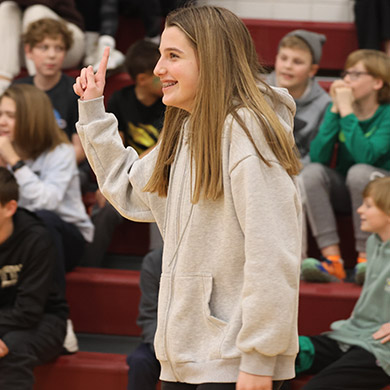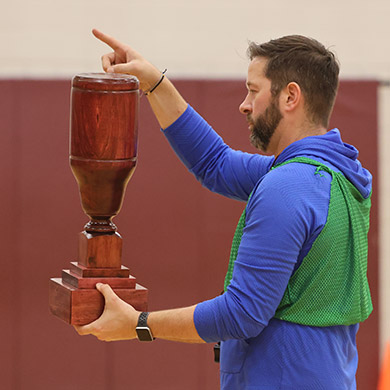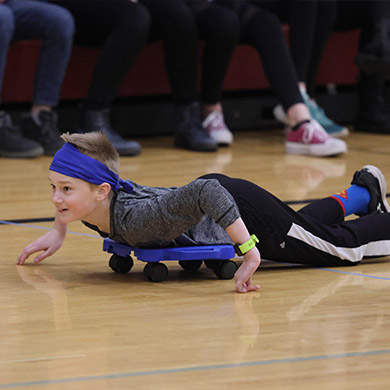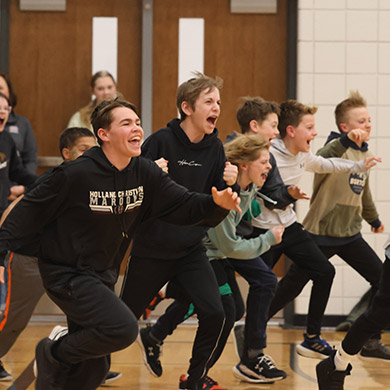Spring 2023 Connections
Behavioral scientists have learned that the ideal ratio of praise to criticism for students is 4:1—that there should be four positive comments for every criticism. You can imagine in an energetic middle school such as ours, this is easier to do for some students than others. And easier on some days than others.
To help make praising students part of our daily routine, though, and to help standardize rules as well as consequences—both positive and negative—Holland Christian Middle School started a program last year called PBIS, or Positive Behavioral Interventions and Supports. It’s not a new program by any means—lots of area and national schools also participate in the program, including both Rose Park and Pine Ridge.
But as is typical of so much of what they do, HCMS has folded their own creative, quality twist into the program: They added a house system at the same time, and are weaving the two programs together in a beautiful way.
One of the beauties of PBIS is that “All staff have common expectations—in the alley, chapel, carpool lane, locker room. [We] want a system that really honors and encourages because that’s better for kids,” HCMS principal Tom Strikwerda explained. “It helps create a positive culture, and each house develops its own flavor.”
Most of us are probably aware of educational “houses” from Harry Potter books or movies; however, academic houses are actually a long-standing British tradition coming back into vogue, partly through the Ron Clark Academy, which quite a few HC staff have attended recently.


”It helps create a positive culture, and each house develops its own flavor...
So HCMS started their own HC-specific, intergrade houses, each with unique logos designed by HCMS art teacher, Jenny Geuder: the Lighthouse, Dunes, Lake, and Windmill houses. At an all-school gathering starting each school year, each 6th-grade student picks their houses randomly out of a hat, then is cheered by their new housemates as their new houses are announced.
“It gives [students] a chance to get excited and passionate about something in school—it’s fun to see them get into it, and a nice change of pace. When it goes well, kids celebrate each other really well—and in ways that wouldn’t happen otherwise,” Tom added.
If a teacher happens to catch a student doing something positive, usually along the lines of their three guidelines of “Be Ready, Be Honorable, and Be Engaged,” then that student receives points for their house. The teacher can add the points right into a house app on his or her phone, and the student’s photo, along with the number of points they just earned, and the house they belong to, all register instantly on a TV screen in the alley where everyone can see it and celebrate it.
HCMS is in year 1.5 of the three-year PBIS program introduction, so things are certainly not perfect. “We’re really good at the celebrating part,” said Katelyn Roskamp, HCMS Spanish teacher, who was hugely instrumental in getting PBIS started. “We just want to make sure we hold students to high expectations, too.”
House points are easy to incorporate into almost any middle school activity, from the monthly House Cup games in the gym, to decorating the halls for Christmas, raising money for the Walkathon or Special Olympics, or bringing food for food drives.
Even for extra credit homework points.
Paige VanderMolen, who serves lunch in the middle school, and Tom have noticed a marked difference in the lunch room in the alley—kids actually clean up after themselves and their friends after lunch, clearing tables, dumping trash, wiping tables with disinfectant spray and a rag. Students can earn extra house points for being extra helpful over lunch—cleaning up, but also helping friends with special needs.
Tom also notices a higher rate of positive student encouragement. Like the time last fall a 6th grader won one of the monthly house Quad Cup games in front of the whole student body, thereby winning points for his Dune house, and the whole Dunes team went crazy cheering for him. “That’s not something that would have happened for him probably otherwise,” Tom said.
Students can also choose to earn individual awards through PBIS, like weekly treats from the treat bin in the office. But it’s usually the house points that seem to inspire them onward to do good deeds—even sometimes doing homework on Fridays.

”We hope it will lead us to be more like Christ, and that helps us as a school as well.
“A nice feature of it is that it allows teachers to give points to students who are not always getting attention,” added Sam Fox, 7th grade English teacher, who also had a significant role in starting and organizing the house program. “It allows you to hopefully celebrate a lot of different students.”
“The idea is that when [students are] consistently rewarded, then it becomes second nature, the behaviors we’re hoping for,” said Tyler Johns, HCMS Behavior Specialist. “It’s basically long-term operant conditioning.”
Students stay with the same house all three years in middle school, along with the same teacher sponsors, building relationships across grade levels and with adults.

Teachers say that PBIS, along with the house system has helped them be more consistent with rules, as all expectations are phrased similarly, and students catch on more quickly since they hear the same rules from all teachers. “It changes the dynamics of how you speak to kids, how kids speak to each other,” Katelyn said. “I’ve really appreciated the shift for me in my language as I did it more and more.”
A special addition to the program this year were student house leaders elected right before 7th-grade camp, four students selected by each house to lead them, take care of details behind the scenes, get a small taste of what it means to be a leader of a larger group. And teachers are learning how to incorporate them into the larger scheme of things, to help students build leadership skills.
But meanwhile, “The houses fit into our vision of how we hope our school to be—our whole goal to learn how to love each other more,” Katelyn said. “We hope it will lead us to be more like Christ, and that helps us as a school as well.”


